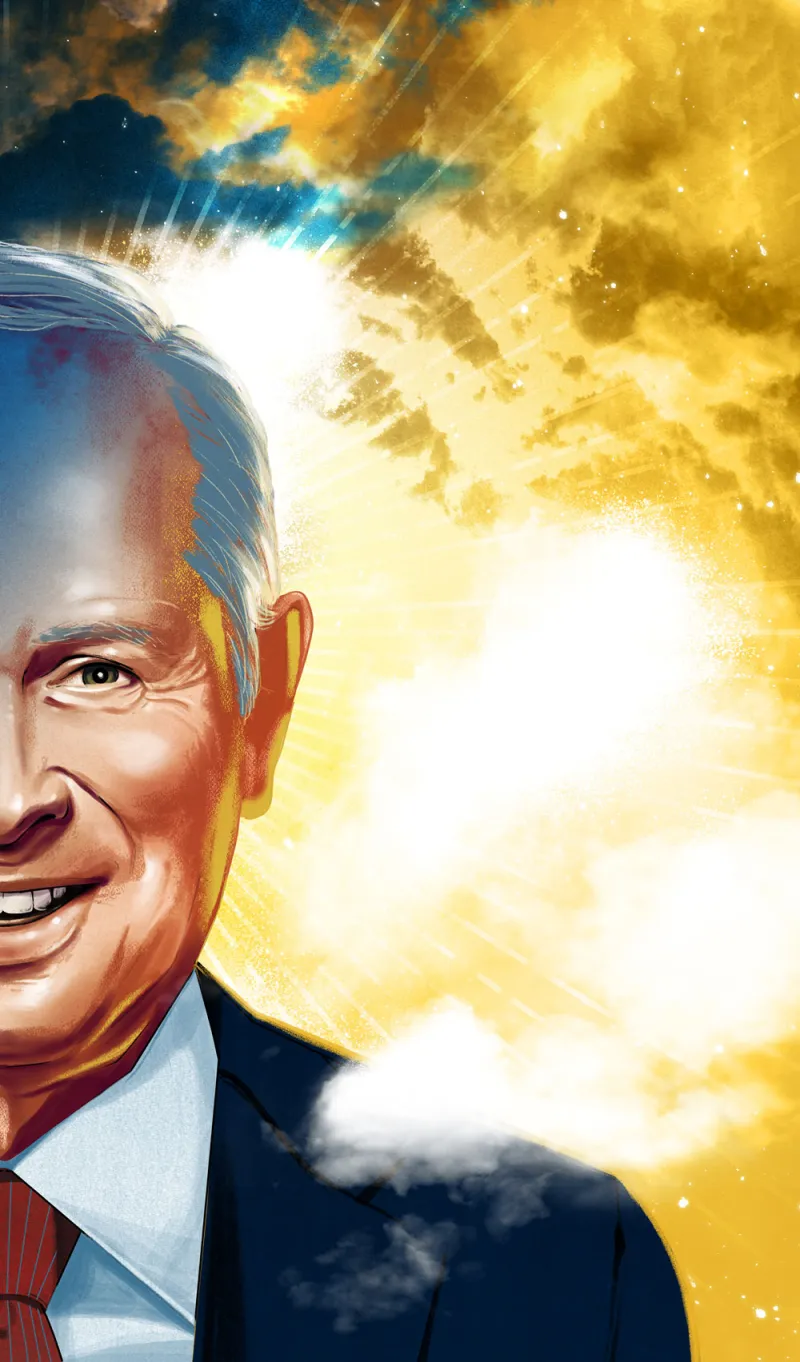
Stephen Schwarzman
(Illustration by Jonathan Bartlett)
Schwarzman and Peterson had launched a growing M&A advisory business, but that wasn’t the ultimate prize they sought. Instead, it was actually owning the companies, and sharing in the value they created, that enticed the Blackstone founders. But just as with their M&A business, gaining clients and assets was an immense struggle — and often an uncomfortable one for Schwarzman.
Pete suggested we wait a couple of weeks before making more follow-up calls and refine our approach. This time, I deferred to his counsel. Second time around, we had a better feel for our pitch and arranged meetings with eighteen potential investors.
The Equitable Insurance Company brought us in for two meetings, ten days apart. When we were called back, we hoped it was just a question of signing them up. At the second meeting, the person we had seen just ten days earlier didn’t even recognize us. “Blackstone?” he said. He couldn’t remember anything about us. It wasn’t even a scheduling error. Pete and I left not just deflated but confused. Were we so irrelevant that people couldn’t even remember who we were?
Delta Airlines’s investment fund agreed to meet us if we came to their office in Atlanta. The night before our 9:00 a.m. appointment, Pete had attended dinner at the White House. I met him at Atlanta’s Hartsfield-Jackson airport and we took a cab to our meeting. Pete always had a giant briefcase with him and now also carried a tuxedo bag. When we got out of the taxi, we were still several hundred yards from the Delta building, which was set back from the road. It was hot and humid. I helped Pete lug his bags. By the time we arrived, we were both sweating through our shirts.
A secretary took us down to the second-level basement, not up to the executive floors. The cinderblock walls were painted a bilious green. Pete and I were sticky and disheveled but did our best to straighten up. Inside the small conference room, we were offered coffee. Pete said no; hot coffee on a hot day didn’t sound great. We’re in the South, I thought. We should be gracious. So I said yes. Our host went over to a card table with a hot plate and a metal coffee carafe and poured me out a brown cup with a white plastic insert. “That’ll be twenty-five cents for the coffee kitty.” I dug into my pocket for a quarter.
We were trying to get $10 million from these people. They had read the material and invited us down. We were offering the kind of fund they usually invested in. We went through our presentation with all of our usual enthusiasm, emphasizing our expertise, our contacts, and the opportunities we saw in the markets. When we finished, I asked the executive who had poured me the coffee, “Do you find this of interest?”
“Oh, yes. Quite interesting, but Delta doesn’t invest in first-time funds.”
“You knew we’re a first-time fund. Why did you ask us all the way to Atlanta?”
“Because you’re both famous people in finance and we wanted to meet you.”
When we left, it was steamier than when we arrived. We dragged our bags back toward the road. Halfway there, Pete looked at me and said, “If you ever do that to me again, I’m going to kill you.”
The rejections were horrible and humbling. The setbacks seemed endless. We met people who lied to us or never showed up for appointments even after we had traveled across the country. People we knew well in positions of authority rejected us. Pete and I talked throughout these struggles. He was not someone who failed. He hated failure. But at the same time, he was sixty years old. He was at a different place than I was, with a different mentality. If I had the drive, he had the patience and equanimity. He picked me up and kept me going. He assured me that when you believe in what you’re doing, overwhelmed or not, you have to keep moving forward, even when the quest feels hopeless. Which it did.
Pete was from an immigrant family. His parents had come to the United States from Greece and opened a restaurant in Kearney, Nebraska, where Pete worked as a boy. He went to college and graduate school and made his way in business thanks to his intelligence and personal skills. He understood the journey I was on, the need I had to make this work. It had been his journey too. We were just on different schedules.
“This is a high hill,” he would tell me before a meeting. “This is really pushing it.” But then he’d suck it up, and we’d go off to meet the next investor, where we’d get shot down again.
Six months after we started and had met almost every prospect who would see us, we hadn’t raised a dollar since our original pledges from New York Life and Met Life. We were nearing the end of our list of eighteen when we reached Prudential. Prudential was the number one financier of leveraged buyouts, the gold standard. We didn’t know anyone there well, so we had saved their meeting to be one of our last. By then we would have our pitch perfected. Garnett Keith, Prudential’s vice chairman and chief investment officer, invited us for lunch in Newark, New Jersey.
As I began talking, Garnett took his first bite of a tuna sandwich on white bread, cut diagonally. As I spoke, he would bite off some more, chew, swallow, and not say a word. His jaw would move, his Adam’s apple roll up and down. By the time he was three-quarters of the way through his sandwich, I had said all I had to say. Garnett put down the last quarter of his sandwich, stopped chewing, and spoke: “You know, that’s interesting. Put me down for 100.”
It was so sudden, so casual. There was nothing legal I wouldn’t have done for that $100 million. If Prudential thought it was a good idea to invest with us, others would follow. I wanted to reach over and snatch away the last quarter of that sandwich to make sure Garnett didn’t choke on it.
We were on our way.
There were four large Japanese brokerages: Nomura, Nikko, Daiwa, and Yamaichi. We didn’t have contacts at any of them and needed representation. I went to Bruce Wasserstein and Joe Perella, two of the top investment bankers at First Boston. They had excellent relations in Japan. Joe had been a friend since we were in the same class at Harvard Business School. Bruce and I had encountered each other regularly in deals, and we played tennis on weekends in the Hamptons. They set us up with one of their bankers who knew the Japanese market.
But when I laid out my plans to him, he told me there was no point approaching the brokerages because they never invested in our kind of fund. I asked him to try. He refused. Only when I threatened to fire him did he arrange a meeting with Nomura and Nikko Securities, a firm that was opening an office in New York. At Nikko, the Japanese barely spoke English. They looked disoriented. They hadn’t a clue about American corporations or investing. I asked them what they were doing here. They told me they were hoping to do some M&A. As respectfully as I could, I told them they had no chance of succeeding in American M&A assignments if they didn’t speak decent English. But a thought occurred to me on the spot. Why not form a joint venture? They could bring the Japanese companies to America, and Blackstone could work with them. A fifty-fifty split of revenues on condition they also invested in our first fund.
It was a creative way for both of us to get what we wanted. We needed money for our fund; they needed to build their M&A business. People in a tough spot will often focus on their own problems when the answer may lie in fixing someone else’s. By paying attention to Nikko’s needs rather than ours, a possible solution had materialized for both of us.
“Right now,” I told them, “you’re going to get 100 percent of no money. You’re going to fail. I can make you successful. All I want is for you to invest in our fund. That’s all I care about. You’ll make plenty of money with it. But what’s important for you isn’t the investment. It’s what I can do for you.” They liked the idea in principle, and we agreed to meet in Japan.
A week later, Pete, a representative from First Boston, and I went to Nikko’s Tokyo headquarters to meet with Yasuo Kanzaki, who ran its international business. The prospect of Blackstone working with Nikko to serve Japanese clients coming to America looking for acquisitions delighted him. “I know we will never be successful in America with our own people,” he said. I thanked him and told him that in addition to the joint venture, we wanted him to invest in our fund. I explained our investment strategy and said I knew my pitch was most unusual.
“I will talk to my colleagues on our executive committee. I have only one request. Do not go to see Nomura before we make a decision.” Nomura was their main competitor, the largest of Japan’s brokerages. Nikko was a distant number two. We agreed. The next day Pete and I woke early for the rest of the meetings. Woozy from jet lag, we both fell asleep in the back seat of the car. When we stopped, I woke up and looked out the window and saw the sign on the building: Nomura.
“What are we doing here?” I said to the rep. “Didn’t we tell you yesterday we can’t go to Nomura?”
“It’s on the schedule,” he said.
“Then tell us how we handle this situation. We promised Nikko we’re not going to meet Nomura. We can’t make a promise then break it.”
“But you can’t insult Nomura. They’re the most important broker. You have an appointment with the executive vice president for international business, the same as the other guy.”
“We can’t be in this position,” I said. “What are our options?”
“You could cancel, but that would be bad manners. You could go and have a nonmeeting meeting, and hope that Nikko doesn’t find out, where you present nothing, like just a courtesy call. Or you can go make your presentation.”
None of these options seemed great. We needed to stop floundering. “We’ve got to call the guy at Nikko and tell him what’s going on and get his advice. We don’t know the customs here, and we don’t want to offend him,” I told Pete. He agreed and made the call. We had one of those giant built-in phones in the car, and we both pressed our ears to the handset, practically kissing each other, so that we could hear Yasuo Kanzaki. We explained that by accident, we were parked outside Nomura. We could hear that sound Japanese people often make when they don’t like something, sucking air in between his teeth.
“You’re at Nomura now?”
“It’s a mistake,” I said. “We’re sorry. We haven’t gone in, and we’re asking your advice. What should we do? Should we just cancel the appointment? Have a nonmeeting meeting? We don’t want to do anything that will offend you.”
“Okay,” Kanzaki said. “Nikko is very interested. How much money do you want for your fund?”
Pete covered up the phone and whispered. “Fifty?”
“A hundred,” I whispered. “It’s what we got from Prudential.”
“We’re looking for $100 million,” said Pete.
“Okay, no problem. $100 million. We have a deal. Now you can go to Nomura and have a nonmeeting.”
As we hung up, I murmured to Pete: “We should have asked for $150 million.”
Recalling this on my sixtieth birthday, Pete said that one of my unique qualities is that my “goals are so demanding and dynamic that sometimes it is even hard for me to accept yes for an answer.”
Inside at the reception desk, we asked for Junko Nakagawa, head of Nomura’s international investments. There was a lot of muttering and confusion until they found someone who spoke English. “I’m so sorry,” he said. “You are not at Nomura headquarters. You are at a brokerage branch.”
We were half an hour late for a nonmeeting we didn’t want in a country where being late is a gross discourtesy. We raced to the Nomura headquarters, asked for Mr. Nakagawa, and apologized. Fifteen minutes passed. Very un-Japanese. Finally someone came. “I’m sorry,” he said. “Mr. Nakagawa is not in Tokyo today. There must have been a mistake with the appointment. But I’m the general manager. I’m no one really, but I can have a courtesy meeting with you.” Which is what we did: a nonmeeting courtesy meeting, during which all we could think of was the $100 million from Nikko.
Their pledge transformed our fortunes. Nikko was the investment bank for the Mitsubishi group, Japan’s largest zaibatsu, or family of related companies. Once Nikko said yes, all the other companies in the zaibatsu said yes too. Everywhere we made our pitch, people said yes. I loved Japan. After months of rejections, we couldn’t stop selling. We flew home with a further $325 million in our fund. Our luck flew home with us.
For months, I had been pitching General Motors’s pension fund, the biggest in America at the time. I had come at them five times through different people in different ways, but kept getting the same answer: we lacked a track record. Then one of the partners at First Boston introduced me to Tom Dobrowski in GM’s real estate division, whom he knew through his church.
When I met Tom, he was wearing Sunday school medals. Strange for an adult, I thought. But my First Boston colleague was right. Tom was smart, and we hit it off. After listening to Pete and me make our pitch, he said, “Jeez, that’s really interesting. Maybe we should do something with you guys.” GM came through with $100 million.
We were rolling. It was as if all the lights along the way had been switched from red to green. I called my old friend Jack Welch, now CEO of General Electric.
“You guys don’t know what you’re doing, do you?” Jack said.
“No,” I said, “but it’s us. We’re the same.”
“Yeah, yeah, yeah. I love you guys. Listen, I’ll give you $35 million. Why? Because you are great, both of you. That way you can use the GE name to help get some other people. Maybe we’ll do some business together. Wouldn’t surprise me.”
When we got up close to $800 million, we began to run short on possibilities. I’d wanted a billion. But it had been a year since we had sent out our initial placement memoranda, a year that had felt like The Perils of Pauline, one heart-stopping event after another. We had persevered through rejection, disappointment, and despair.
There is a saying in finance that time wounds all deals. The longer you wait, the more nasty surprises can hurt you. I like to finish work quickly. Even if tasks are not urgent, I like to get them done to avoid the unnecessary risks of delay. I determined to do the same with the fund. By September 1987, stock markets were hitting record highs, and I did not want to get caught if they turned. We decided to push hard to close the fund and wrap up the legal details as soon as possible.
Each of our thirty-three investors had a team of lawyers, and each lawyer wanted everything done right. It was like fighting thirty-three fights in thirty-three foreign countries all at the same time. But we pushed hard to have everything signed and sealed by Thursday, October 15, and we did it. Caroline James, our only associate, who was handling the closing, left soon afterward to become a therapist. She would have a lifetime of case material just from working with me on the closing.
I arrived at the office after the weekend, on the morning of Monday, October 19, with our fund closed and the money committed. That day, the Dow dropped 508 points, the largest one-day percentage drop in stock market history, bigger than the one that triggered the Great Depression. If we had taken an extra day or two to close the fund, we would have been caught in the downdraft of Black Monday. The money could have slipped away, all our efforts gone to waste. Our urgency had saved us. We were ready to start investing.
Read the first installment — Stephen Schwarzman Hung Out a Shingle. Then He Waited. — here.
You can buy What It Takes here.





